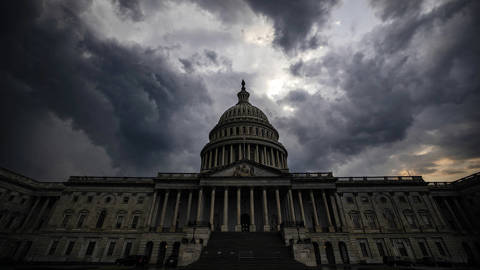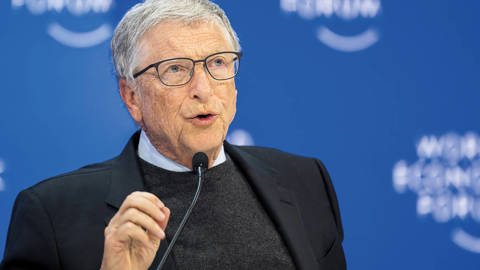With democratic governance coming under increasing strain globally, advocates of popular sovereignty find themselves struggling to defend it during the biggest election year in history. The situation demands a caliber of political leadership that seems to be in short supply.
LONDON – On its face, 2024 might seem like a triumph for democracy. With more than half the world’s population living in countries where legislative and presidential polls are scheduled, this is the biggest election year ever. But there is little cause for celebration, because all this voting comes at a time when democratic governance itself is on the ballot.
To advocates of democracy, the system’s virtues are self-evident. It is the most likely to produce results aligned with what most citizens want, most of the time. It is well equipped to remove corrupt, incompetent, or unwanted leaders. It fosters a reluctance to go to war. It is the system that most people will choose if given the choice, and the one that people are most prepared to fight for.
To its critics, democracy often struggles to respond decisively to big problems, such as how to pay for health care and other rising costs associated with an aging population. As senior Chinese officials have put it to British ministers, if a system cannot persuade people to make sacrifices for the long-term good of the country, it simply is not sustainable.
Moreover, democracy’s standard-bearers – the United States and its transatlantic allies – have increasingly come under fire for their double standards, as when they preach respect for human rights while ignoring the international laws they helped create whenever it suits them. The task of answering this charge has increasingly become intertwined with the defense of democracy more broadly.
A truly democratic vote requires that candidates be free to campaign, and that the electoral process be free and fair. There must be a real chance for voters to change their political leaders from time to time – a criterion that is crucial to the “loser’s consent” upon which any properly functioning democracy depends.
In India, the world’s most populous democracy, elections have met these standards in the past, but the question now is whether Prime Minister Narendra Modi’s government will undermine minority rights to maintain power. In Indonesia, the question before the election on February 14 was whether the old guard would really let new contenders pose a genuine electoral challenge. In South Africa – which is holding its most contested election since the transition from apartheid was completed in 1994 – the question is whether the ruling African National Congress will agree to share power if the result demands it.
This is just a sampling of the kinds of strain we will see around the world, and the tensions in older democracies could be even worse. In the United Kingdom (where an election is expected between May and the end of the year), successive governments have consistently failed to persuade voters that they cannot have all the public services they want – including health care – without higher taxes. In France, the government has struggled to push through pension and agriculture reforms in the face of massive protests.
The European Parliament elections in June will offer an early signal of how these policy initiatives have been received. Above all, however, they will reveal whether migration pressure is indeed causing a sustained shift toward more nationalist anti-immigration parties.
These pressures have already propelled Giorgia Meloni to the premiership in Italy and delivered an unprecedented victory for Geert Wilders’ nationalist Party for Freedom in last year’s Dutch election. Migration concerns contributed to the 2016 Brexit referendum outcome and continue to dog Prime Minister Rishi Sunak’s government today. In the US, “the southern border” is now the issue most likely to jeopardize President Joe Biden’s re-election chances (along with his apparent frailty).
Given the current mood, it will take considerable political leadership to persuade voters that some migration may be necessary for economic growth (and to keep inflation down), or even that it is under control. The same applies to the more recent debate over military spending. As Russia’s war against Ukraine grinds on, there is growing resistance in the US Congress to supporting Ukraine’s defense. Decades of American complaints that Europe is not paying its way are acquiring a hard edge. If Donald Trump wins in November, the US commitment to Europe’s defense will be in question. But while European governments recognize that they will have to pay more for their countries’ defenses, that money will have to come from somewhere – either higher taxes or reallocated spending.
In the meantime, the charge of hypocrisy by many other countries will grow louder. While the accusation is not new, it has become more vehement since Russia’s invasion of Ukraine, when Western countries called on others to condemn the Kremlin’s outrageous aggression. Many did, but many others declined to take a side.
The accusation has been further inflamed by the Israel-Hamas conflict. Here, the charge is that the US (above all) long allowed Israel to violate international law with its West Bank settlements and now has failed to stay the Israeli military’s hand in Gaza. Obviously, there are no easy answers. But a greater public effort to address contradictions and double standards certainly would help, such as by pushing for a solution that includes a recognition of both Palestinian rights and a state. More than that, however, it means recognizing what many countries now demand of the West (including, for example, greater support for coping with climate change).
Big election years always bring uncertainty. In 2024, the single most consequential result for the world will come from the US presidential race. But make no mistake: democracy itself is also at stake. The leaders of the world’s democracies need to make the case that they can solve problems at home and contribute to solutions abroad with all the moral consistency that the rest of the world has come to expect.






LONDON – On its face, 2024 might seem like a triumph for democracy. With more than half the world’s population living in countries where legislative and presidential polls are scheduled, this is the biggest election year ever. But there is little cause for celebration, because all this voting comes at a time when democratic governance itself is on the ballot.
To advocates of democracy, the system’s virtues are self-evident. It is the most likely to produce results aligned with what most citizens want, most of the time. It is well equipped to remove corrupt, incompetent, or unwanted leaders. It fosters a reluctance to go to war. It is the system that most people will choose if given the choice, and the one that people are most prepared to fight for.
To its critics, democracy often struggles to respond decisively to big problems, such as how to pay for health care and other rising costs associated with an aging population. As senior Chinese officials have put it to British ministers, if a system cannot persuade people to make sacrifices for the long-term good of the country, it simply is not sustainable.
Moreover, democracy’s standard-bearers – the United States and its transatlantic allies – have increasingly come under fire for their double standards, as when they preach respect for human rights while ignoring the international laws they helped create whenever it suits them. The task of answering this charge has increasingly become intertwined with the defense of democracy more broadly.
A truly democratic vote requires that candidates be free to campaign, and that the electoral process be free and fair. There must be a real chance for voters to change their political leaders from time to time – a criterion that is crucial to the “loser’s consent” upon which any properly functioning democracy depends.
In India, the world’s most populous democracy, elections have met these standards in the past, but the question now is whether Prime Minister Narendra Modi’s government will undermine minority rights to maintain power. In Indonesia, the question before the election on February 14 was whether the old guard would really let new contenders pose a genuine electoral challenge. In South Africa – which is holding its most contested election since the transition from apartheid was completed in 1994 – the question is whether the ruling African National Congress will agree to share power if the result demands it.
SPRING SALE: Save 40% on all new Digital or Digital Plus subscriptions
Subscribe now to gain greater access to Project Syndicate – including every commentary and our entire On Point suite of subscriber-exclusive content – starting at just $49.99.
Subscribe Now
This is just a sampling of the kinds of strain we will see around the world, and the tensions in older democracies could be even worse. In the United Kingdom (where an election is expected between May and the end of the year), successive governments have consistently failed to persuade voters that they cannot have all the public services they want – including health care – without higher taxes. In France, the government has struggled to push through pension and agriculture reforms in the face of massive protests.
The European Parliament elections in June will offer an early signal of how these policy initiatives have been received. Above all, however, they will reveal whether migration pressure is indeed causing a sustained shift toward more nationalist anti-immigration parties.
These pressures have already propelled Giorgia Meloni to the premiership in Italy and delivered an unprecedented victory for Geert Wilders’ nationalist Party for Freedom in last year’s Dutch election. Migration concerns contributed to the 2016 Brexit referendum outcome and continue to dog Prime Minister Rishi Sunak’s government today. In the US, “the southern border” is now the issue most likely to jeopardize President Joe Biden’s re-election chances (along with his apparent frailty).
Given the current mood, it will take considerable political leadership to persuade voters that some migration may be necessary for economic growth (and to keep inflation down), or even that it is under control. The same applies to the more recent debate over military spending. As Russia’s war against Ukraine grinds on, there is growing resistance in the US Congress to supporting Ukraine’s defense. Decades of American complaints that Europe is not paying its way are acquiring a hard edge. If Donald Trump wins in November, the US commitment to Europe’s defense will be in question. But while European governments recognize that they will have to pay more for their countries’ defenses, that money will have to come from somewhere – either higher taxes or reallocated spending.
In the meantime, the charge of hypocrisy by many other countries will grow louder. While the accusation is not new, it has become more vehement since Russia’s invasion of Ukraine, when Western countries called on others to condemn the Kremlin’s outrageous aggression. Many did, but many others declined to take a side.
The accusation has been further inflamed by the Israel-Hamas conflict. Here, the charge is that the US (above all) long allowed Israel to violate international law with its West Bank settlements and now has failed to stay the Israeli military’s hand in Gaza. Obviously, there are no easy answers. But a greater public effort to address contradictions and double standards certainly would help, such as by pushing for a solution that includes a recognition of both Palestinian rights and a state. More than that, however, it means recognizing what many countries now demand of the West (including, for example, greater support for coping with climate change).
Big election years always bring uncertainty. In 2024, the single most consequential result for the world will come from the US presidential race. But make no mistake: democracy itself is also at stake. The leaders of the world’s democracies need to make the case that they can solve problems at home and contribute to solutions abroad with all the moral consistency that the rest of the world has come to expect.